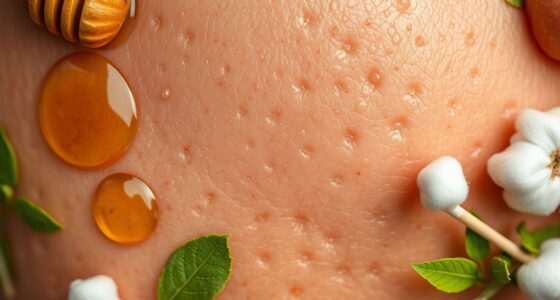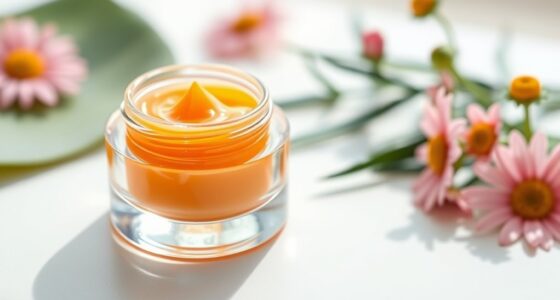Anti-aging peptides are supported by scientific research as effective ingredients that stimulate collagen and elastin production, making your skin firmer and reducing wrinkles. They work by signaling your skin cells to perform specific functions, and their stability and proper formulation are key to their success. Clinical trials show they can improve skin elasticity and texture, though individual results vary, and long-term studies are limited. Exploring more about how these peptides truly benefit you is worth your time.
Key Takeaways
- Scientific studies show peptides stimulate collagen and elastin production, reducing wrinkles and improving skin firmness.
- Peptides mimic cellular signals to promote skin renewal and decrease inflammation, supporting anti-aging effects.
- Topical peptides are effective when formulated for stability and deep skin penetration, backed by clinical trials.
- Safety profiles of peptides are well-established, with synthetic options offering consistent, reliable anti-aging benefits.
- Ongoing research aims to enhance peptide stability and delivery, advancing personalized and more effective anti-aging skincare.
Understanding Anti‑Aging Peptides and How They Work
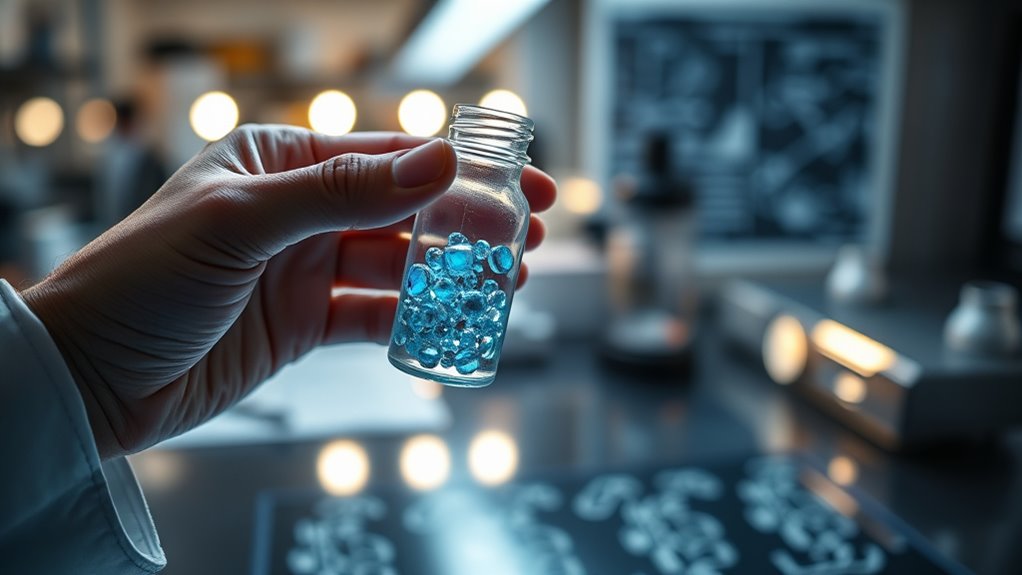
Anti-aging peptides are short chains of amino acids that play an essential role in signaling your skin cells to perform specific functions. Their effectiveness depends heavily on peptide stability, which determines how well they resist degradation and maintain activity over time. Stable peptides are more likely to reach your skin’s deeper layers intact, ensuring maximum benefit. Additionally, topical absorption is fundamental; if peptides cannot penetrate the skin barrier effectively, they won’t activate the necessary cellular processes. Formulation techniques, like using advanced carriers or encapsulation, enhance peptide stability and improve absorption. When these factors are optimized, peptides can stimulate collagen production, reduce wrinkles, and promote skin renewal, making them a powerful tool in anti-aging skincare routines. peptide stability is crucial in ensuring these skincare ingredients perform their intended functions effectively. Considering the importance of meditation and mindfulness practices, incorporating relaxation techniques can also support skin health by reducing stress-induced aging. Additionally, understanding the skin barrier and how to support its integrity can significantly improve the efficacy of topical anti-aging treatments. Moreover, research indicates that antioxidant properties in skincare formulations can further enhance the effects of peptides by neutralizing free radicals that accelerate aging.
The Scientific Evidence Supporting Peptides in Skincare
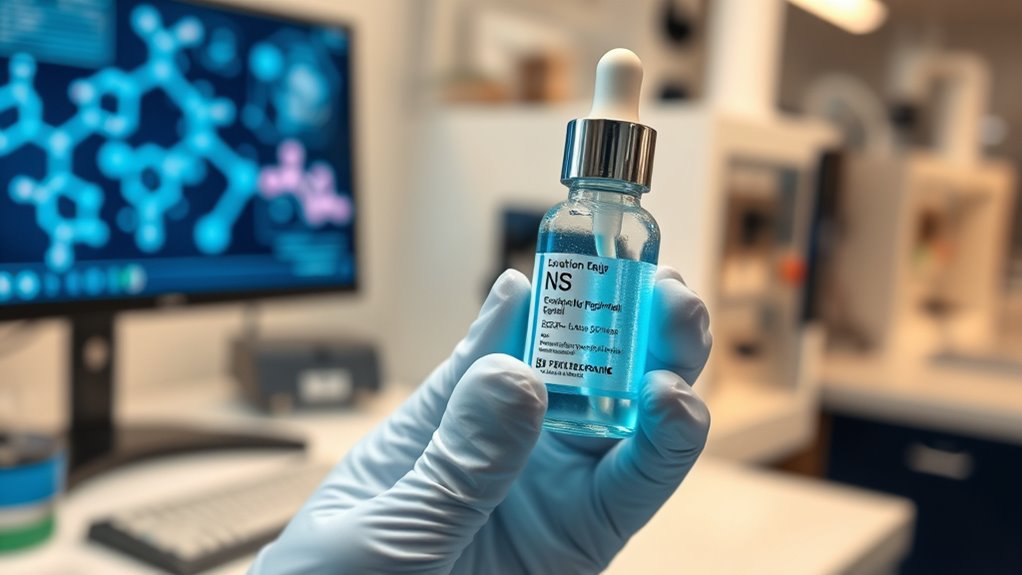
Scientific studies have shown that peptides can effectively improve skin aging signs through clinical trial results. These trials reveal how peptides work by stimulating collagen production and promoting skin repair. Understanding these mechanisms helps you see why peptides are supported by solid scientific evidence for skincare benefits.
Clinical Trial Results
While research on peptides in skincare is still evolving, several clinical trials have provided promising evidence of their effectiveness. These studies demonstrate that peptides can improve skin elasticity, reduce wrinkles, and boost collagen production. Importantly, researchers have considered peptide stability to guarantee these compounds remain effective after formulation and application. Many of these trials also focus on safety, which is vital for gaining regulatory approval. Some peptides have already received approval for specific uses, highlighting their potential in skincare. Although more extensive research is needed, current clinical trial results suggest that certain peptides are both safe and beneficial, making them promising ingredients for anti-aging products. These findings support their growing integration into skincare regimens.
Mechanisms of Action
Peptides work by signaling your skin cells to perform specific functions that promote a youthful appearance. They do this through processes like peptide synthesis, where amino acids form chains that instruct cells to produce collagen, elastin, or other structural proteins. Skin penetration is vital; effective peptides must reach deeper layers of the skin to activate these responses. The following table highlights key mechanisms:
| Mechanism | How It Works | Impact on Skin |
|---|---|---|
| Collagen stimulation | Peptides mimic natural signals to boost collagen production | Firms and plumps skin |
| Elastin enhancement | Promote elastin synthesis to improve elasticity | Reduces sagging |
| Anti-inflammatory | Signal for reduced inflammation and redness | Calms irritated skin |
| Skin barrier repair | Encourage cell turnover and barrier restoration | Improves texture and hydration |
Additionally, understanding the local laws surrounding skincare products can help ensure the safety and efficacy of peptide formulations. Incorporating peptides into a comprehensive well-being routine can further enhance skin health and overall vitality. Recognizing the importance of scientific evidence in selecting effective peptides is crucial for achieving the desired anti-aging results. Scientific insights can also inform how peptides influence artistic practice, especially when considering innovative formulations and delivery methods.
Common Types of Anti‑Aging Peptides and Their Functions

You’ll find that collagen-boosting peptides help restore your skin’s firmness and elasticity. Signal-enhancing peptides work by communicating with skin cells to improve overall skin health. Together, these types of peptides target key signs of aging for a more youthful appearance. Incorporating these peptides into your skincare routine can also promote skin cell communication, leading to more effective results. Additionally, ongoing research into peptide formulations is driving innovations in anti-aging skincare. Given the role of AI in digital life advancements, innovative skincare solutions are increasingly being developed using AI-driven research and data analysis. Furthermore, advancements in skincare ingredient transparency ensure consumers are better informed about the formulations they choose.
Collagen-Boosting Peptides
Have you ever wondered how some anti-aging products seem to restore firmness and reduce wrinkles? Collagen-boosting peptides are key players. They work by signaling your skin to produce more collagen, improving elasticity and smoothness. When choosing these ingredients, peptide stability matters—stable peptides deliver consistent results and don’t break down quickly. Ingredient sourcing also impacts effectiveness; high-quality, ethically sourced peptides tend to be more potent and pure. Look for formulations that use well-researched peptides like Palmitoyl Peptide-7 or Acetyl Hexapeptide-8. These ingredients actively encourage your skin’s natural collagen synthesis. When combined with good peptide stability and quality sourcing, collagen-boosting peptides can considerably enhance your skin’s firmness and youthful appearance over time.
Signal-Enhancing Peptides
Building on the benefits of collagen-boosting peptides, signal-enhancing peptides focus on activating your skin’s internal communication pathways to promote a more youthful appearance. These peptides stimulate your skin cells to increase production of essential proteins, improving elasticity and firmness. Their synthetic safety has been well-studied, making them reliable options for anti-aging routines. Peptide stability is crucial; stable formulations ensure consistent effectiveness over time. Some common types include Palmitoyl Tripeptide-1 and Acetyl Tetrapeptide-5, which target cell signaling and reduce puffiness. Incorporating these peptides helps your skin respond better to repair signals, enhancing overall vitality. To better understand their roles, consider this table:
| Peptide Type | Primary Function |
|---|---|
| Palmitoyl Tripeptide-1 | Stimulates collagen synthesis |
| Acetyl Tetrapeptide-5 | Reduces puffiness and promotes firmness |
| Signal peptides | Activate skin’s internal communication |
| Stability focus | Ensures consistent, long-term efficacy |
| Synthetic safety | Prioritized in formulation development |
Additionally, understanding the safety profile of these peptides is essential for maintaining skin health while achieving anti-aging benefits. Considering the ingredients used in peptide formulations can also influence their effectiveness and safety.
Clinical Trials and Real-World Effectiveness
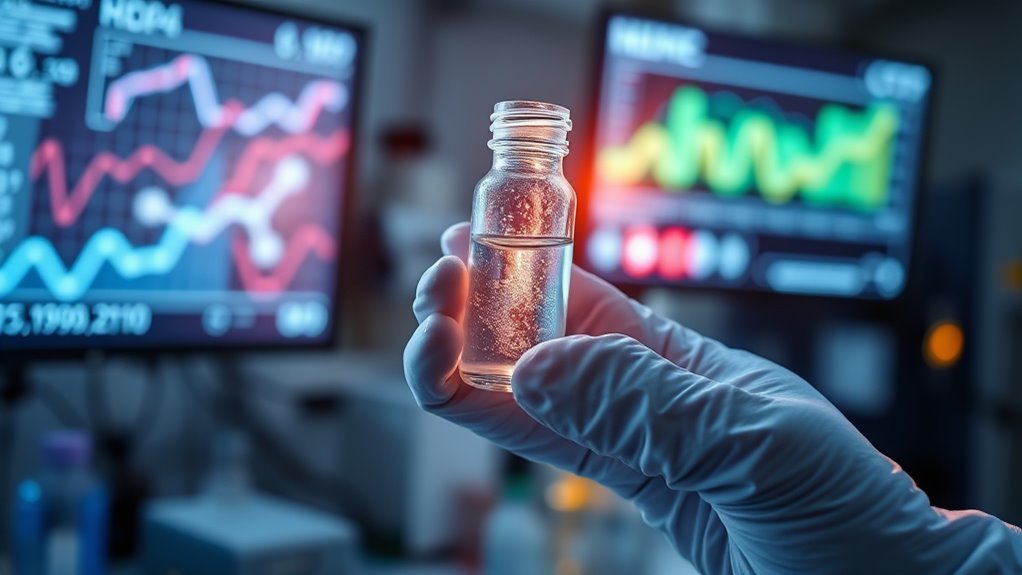
How well do anti-aging peptides perform outside the controlled environment of clinical trials? In real-world settings, their effectiveness can vary due to factors like formulation stability and individual differences. Many peptides are incorporated into cosmetic formulations, but these products often face regulatory challenges that limit the ability to claim specific anti-aging benefits. Unlike clinical trials, where variables are tightly controlled, consumer use introduces inconsistencies that can impact results. While some users report noticeable improvements, scientific evidence from large-scale, long-term studies remains limited. This regulatory environment further complicates the ability to substantiate claims and assess real-world efficacy. Additionally, biological variability among individuals can influence the outcomes of peptide treatments. The formulation stability of peptide products is crucial for maintaining their effectiveness over time, which adds another layer of complexity. The delivery mechanisms of peptides also play a significant role in their skin absorption and ultimate effectiveness. As a result, the true effectiveness of anti-aging peptides in everyday skincare continues to be an area of active investigation and debate.
Limitations and Considerations When Using Peptide Products
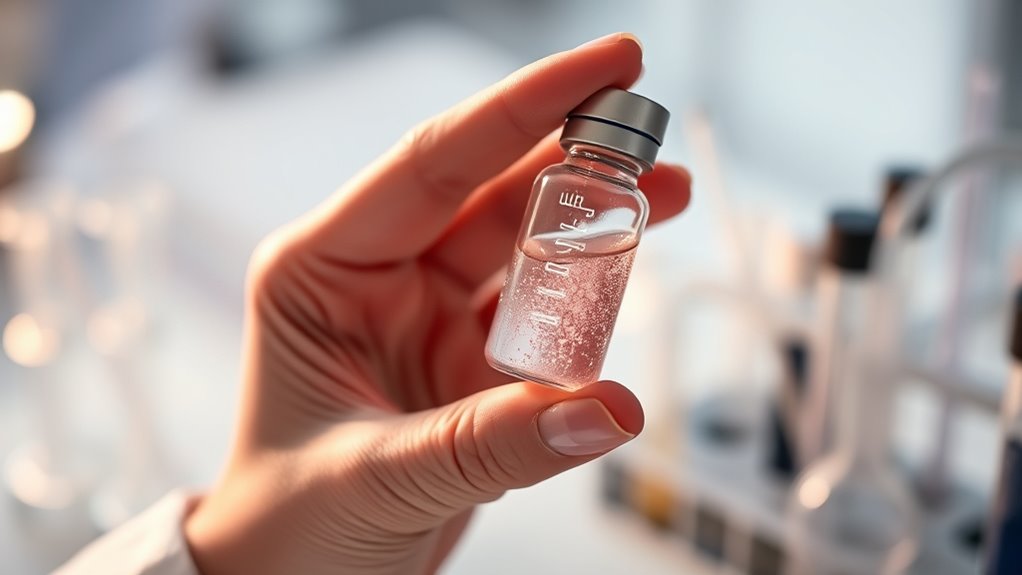
While peptide products hold promise for anti-aging benefits, several limitations must be considered before incorporating them into your skincare routine. First, the cost and accessibility can be significant; high-quality peptides often come with a hefty price tag and may not be easily available everywhere. Second, regulatory challenges mean some products lack strict oversight, raising questions about their safety and efficacy. Third, the stability of peptides can be compromised by exposure to light or heat, reducing their effectiveness. Fourth, individual responses vary; what works for one person might not work for another, making it hard to predict results. Keep these factors in mind to make informed decisions and avoid disappointment or wasted investment.
Future Directions and Emerging Research in Peptide Skincare

Emerging research is paving the way for more effective and targeted peptide skincare formulations. Scientists are focusing on improving peptide stability, which is vital for ensuring these ingredients remain active and effective upon application. Advances in delivery systems, such as nanotechnology, help protect peptides from degradation, increasing their potency. Additionally, researchers are exploring synthetic peptides with enhanced stability and specificity to target aging signs more precisely. Personalized skincare approaches are becoming more prevalent, allowing formulations to be tailored to individual skin needs. Furthermore, addressing security vulnerabilities in peptide formulations and delivery methods is crucial to maintain product integrity and consumer trust. The integration of renewable energy sources in production processes could further improve the environmental footprint of peptide manufacturing. However, regulatory challenges continue to slow progress, as safety and efficacy standards vary across regions. Overcoming these hurdles requires ongoing collaboration between scientists and regulatory bodies. As research advances, expect to see more innovative peptide products that are both more stable and better regulated, ultimately offering consumers more reliable anti-aging skincare options. Moreover, understanding personal development techniques like goal setting and mindfulness can enhance customer confidence and support consistent skincare routines.
Frequently Asked Questions
Are Anti-Aging Peptides Safe for All Skin Types?
You might wonder if anti-aging peptides are safe for all skin types. Generally, they offer good skin compatibility, but there’s still a potential allergy risk, especially if you have sensitive skin or allergies. It’s wise to do a patch test first and consult with a dermatologist. While most people tolerate peptides well, individual reactions can vary, so paying attention to your skin’s response is key to safe use.
How Long Does It Take to See Results From Peptide Treatments?
You might worry that peptide treatments take forever, but you’ll start noticing visible improvements within a few weeks. Typically, the treatment timeline shows subtle changes after 4-6 weeks, with more noticeable results around 8-12 weeks. Consistency is key, and patience pays off. Keep in mind, everyone’s skin reacts differently, so while some see quick results, others might need a bit more time to achieve their desired glow.
Can Peptides Replace Traditional Anti-Aging Skincare Products?
You might wonder if peptides can replace traditional anti-aging skincare. While peptides target skin renewal more directly, antioxidants protect against damage. Peptide application methods, like topical creams or serums, guarantee better absorption and results. However, peptides and antioxidants often work best together, complementing each other. So, rather than replacing your current products, consider integrating peptides to enhance your skincare routine for more all-encompassing anti-aging effects.
Are There Any Known Side Effects Associated With Peptide Use?
In the age of digital revolutions, you might wonder about peptide use and its risks. While peptides can benefit your skin, some individuals experience peptide allergies, leading to reactions. Long-term safety remains uncertain, as research is ongoing. It’s wise to consult a healthcare professional before use, especially if you have sensitive skin or allergies. Being informed helps you make safer decisions and minimize potential side effects.
How Do Peptides Compare to Retinoids in Anti-Aging Effectiveness?
When comparing peptides and retinoids for anti-aging, peptides excel in skin penetration, helping deliver signals that promote collagen synthesis, which reduces wrinkles and improves elasticity. Retinoids also boost collagen but work mainly by increasing cell turnover. You might notice faster results with peptides for skin firmness, while retinoids often improve skin texture and tone. Both are effective, but peptides focus more on stimulating collagen directly.
Conclusion
As you navigate the world of anti-aging peptides, remember they’re like tiny architects rebuilding your skin’s foundation. While science lights the way, your journey is personal—full of hope and discovery. Embrace these powerful molecules as allies in your quest for youthful radiance, but stay curious and cautious. With each step, you’re writing a new chapter—where science and self-care weave a story of renewal, resilience, and timeless beauty.




